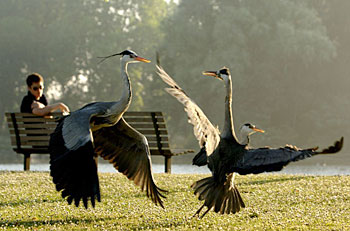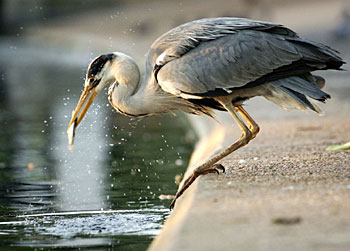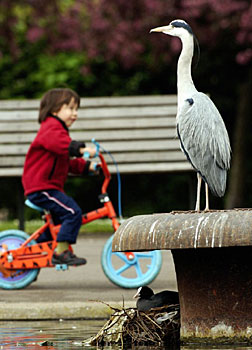Herons - Britain is becoming overrun with the large birds.
First the fox, so common in Britain that it was once hunted although now it's illegal, started moving into towns and cities rather than just being in the countryside. Now the heron is doing the same thing.
According to the Royal Society for the Protection of Birds, 471 pairs of herons were spotted in London alone in 2001, and at least 13,000 pairs have been recorded across Britain.
--------------------------------------------------------------------------------------

We've all heard about the urban fox but now it seems the heron is also abandoning its rural haunts for our inner cities. According to the RSPB, 471 pairs of herons were spotted in London alone in 2001. With its huge 6ft wing-span and razor-sharp, rapter-like beak, the heron can appear very intimidating but this deadly predator will not attack humans.
---------------------------------------------------------

Legal protection, mild winters and improvements in water quality have all helped to encourage more herons than ever, with at least 13,000 pairs recorded across Britain. The species can live for up to 25 years. The birds are opportunitists, eating everything from frogs, rats, toads, water fowls and even ducklings.
------------------------------------------------------

Two herons scrap over territory during the mating season. Grey heron can fly for miles looking for food and have discovered there are rich pickings in places such as London's Regent's Park. They can often be seen standing like statues on the banks of Regent's Canal, their sharp beaks fixed on the water as they wait to pounce on passing fish. In Kelsey Park in Beckenham, Kent there are 32 nests, the biggest urban heron colony in Britain.
-------------------------------------------------------------

A voracious feeder, the heron breeds in colonies - sometimes hundreds of them will gather - and can quickly take over lakes, ponds and reservoirs. Because they are gregarious, the model herons that gardeners buy to try to scare them away from their goldfish ponds can actually attract other herons. Apart from gardeners they also infuriate anglers because herons target fish and eels up to a couple of pounds in weight.
dailymail.co.uk
First the fox, so common in Britain that it was once hunted although now it's illegal, started moving into towns and cities rather than just being in the countryside. Now the heron is doing the same thing.
According to the Royal Society for the Protection of Birds, 471 pairs of herons were spotted in London alone in 2001, and at least 13,000 pairs have been recorded across Britain.
--------------------------------------------------------------------------------------

We've all heard about the urban fox but now it seems the heron is also abandoning its rural haunts for our inner cities. According to the RSPB, 471 pairs of herons were spotted in London alone in 2001. With its huge 6ft wing-span and razor-sharp, rapter-like beak, the heron can appear very intimidating but this deadly predator will not attack humans.
---------------------------------------------------------

Legal protection, mild winters and improvements in water quality have all helped to encourage more herons than ever, with at least 13,000 pairs recorded across Britain. The species can live for up to 25 years. The birds are opportunitists, eating everything from frogs, rats, toads, water fowls and even ducklings.
------------------------------------------------------

Two herons scrap over territory during the mating season. Grey heron can fly for miles looking for food and have discovered there are rich pickings in places such as London's Regent's Park. They can often be seen standing like statues on the banks of Regent's Canal, their sharp beaks fixed on the water as they wait to pounce on passing fish. In Kelsey Park in Beckenham, Kent there are 32 nests, the biggest urban heron colony in Britain.
-------------------------------------------------------------

A voracious feeder, the heron breeds in colonies - sometimes hundreds of them will gather - and can quickly take over lakes, ponds and reservoirs. Because they are gregarious, the model herons that gardeners buy to try to scare them away from their goldfish ponds can actually attract other herons. Apart from gardeners they also infuriate anglers because herons target fish and eels up to a couple of pounds in weight.
dailymail.co.uk